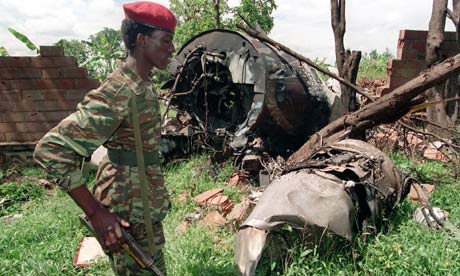 |
| "The wreckage of the plane that was shot down killing Rwanda's president Juvénal Habyarimana in 1994." (AP/Jean Marc Boujou) |
By Linda Melvern
The Guardian, January 10, 2012
"Few events have been the subject of as many rumours and lies as the assassination on 6 April 1994 of Rwanda's President Juvénal Habyarimana. We may never know the identity of the assassins who fired the two missiles that blew his jet apart as it came in to land at Kigali International Airport; yet this one key event signalled the targeted elimination of Rwanda's political opposition, and triggered the genocide of the Tutsi people. Since that night there has been a ceaseless propaganda war, with each side blaming the other for what happened. One version is that the rebel Tutsi RPF assassinated the Hutu president in a cynical bid to oust his regime; another version blames Hutu extremists who, faced with the possibility of power-sharing with the Tutsi minority, carried out a coup d'etat in order to create a 'pure Hutu' state. This is why the publication of an expert investigation into the aircraft crash in Paris today will have such tremendous repercussions. After 18 years it has essentially settled the central question of who was morally responsible for triggering the genocide. In some 400 detailed pages, including the conclusions of six experts who visited the crash site in 2010, the report has provided scientific proof that, as the plane made a final approach, the assassins were waiting in the confines of Kanombe military camp -- the highly fortified home of Rwanda's French-trained elite unit known as the Presidential Guard, and which is directly under the flight path.
This secure military barracks would have been inaccessible to RPF rebels, a point made some years ago in a report on the crash produced by the Rwandan government. The government will feel vindicated, but it will be keen nonetheless to consign this episode to the history books: its priority remains to create a united society. In France the report is likely to cause considerable embarrassment -- certainly and most immediately for Judge Jean-Louis Bruguière, an investigating magistrate who first looked at the assassination in 1997 and was convinced the missiles were fired by an RPF hit-squad from a farm near the airport. In his own report he named current Rwandan government officials, including the head of Rwanda's army, as being responsible, and in 2006, amid worldwide publicity, he issued nine international warrants for their arrest. There was a storm of outrage in Kigali and diplomatic ties with France were broken, although there has since been a rapprochement. [...]"














No comments:
Post a Comment
Please be constructive in your comments. - AJ